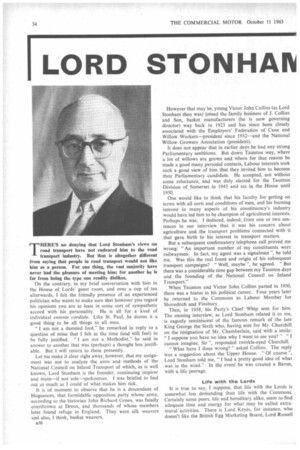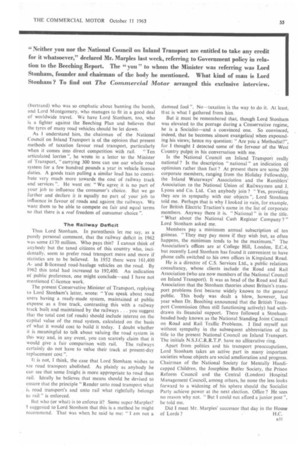LORD STONHAN
Page 56

Page 57

If you've noticed an error in this article please click here to report it so we can fix it.
THERE'S no denying that Lord Stonham's views on road transport have not endeared him to the road transport industry. But that is altogether different from saying that people in road transport would not like him as a person. For one thing, the vast majority have never had the pleasure of meeting him; for another he is far from being the type one readily dislikes.
On the contrary, in my brief conversation with him in the House of Lords' guest room, and over a cup of tea afterwards, I felt the friendly presence of an experienced politician who wants to make sure that however you regard his opinions you are at least in some sort of sympathetic accord with his personality. He is all for a kind of individual entente cordiale. Like St. Paul, he deems it a good thing to be all things to all men.
"I am not a damned fool," he remarked in reply to a question of mine that I felt at the time (and still feel) to be fully justified. . "I am not a Methodist," he said in answer to another that was (perhaps) a thought less justifiable. But I will return to these presently.
Let me make it clear right away, however, that my assignment was not to analyze the aims and methods of the National Council on Inland Transport of which, as is well known, Lord Stonham is the founder, continuing inspirer and main—if not sole—spokesman. I was briefed to find out as much as I could of what makes him tick.
It is of moment to observe that he is a descendant of Huguenots, that formidable opposition party whose army, according to the historian John Richard Green, was fatally overthrown at Dreux, and thousands of whose members later found refuge in England. They were silk weavers and also, I think, basket weavers.
a30 However that may be, young Victor John Collins (as Lord Stonham then was) joined the family business of .J. Collins and Son, basket manufacturers (he is now governing director) way back in 1923 and has since been closely associated with the Employers' Federation of Cane and Willow. Workers—president since 1932—and the National Willow Growers Association (president).
It does not appear that in earlier days he had any strong Parliamentary ambitions. But down Taunton way, where a lot of willows are grown and where for that reason he made a good many personal contacts, Labour interests took such a good view of him that they invited him to become their Parliamentary candidate. He accepted, not without some reluctance, and was duly elected for the Taunton Division of Somerset in 1945 and sat in the House until 1950.
One would like to think that his faculty for getting on terms with all sorts and conditions of men, and his burning interest in many aspects of his constituency's industry would have led him to be champion of agricultural interests. Perhaps he was. I deduced, indeed, from one or two sentences in our interview that it was his concern about agriculture and the transport problems connected with it that gave birth to his interest in transport matters.
But a subsequent confirmatory telephone call proved me wrong: "An important number of my constituents were railwaymen. In fact, my agent was a signalman ", he told me. Was this the real fount and origin of his subsequent transport campaigns? "Well, maybe ", he agreed. "But there was a considerable time gap between my Taunton days and the founding of the National Council on Inland Transport."'
When Taunton and Victor John Collins parted in 1950, there wa& a hiatus. in his political career. Four years later he returned to the Commons as Labour Member for Shoreditch and Finsbury.
Then, in 1958, his Party's Chief Whip sent for him_ The ensuing interview, as Lord Stonham related it to me, is vaguely reminiscent of the famous remark of the late King George the Sixth who, having sent for Mr. Churchill on the resignation of Mr. Chamberlain, said with a smile: "I suppose you have no idea why I want to see you?" "I cannot imagine, Sir ", responded twinkle-eyed Churchill.
"What have I done wrong?" asked Collins. The reply was a suggestion about the Upper House. "Of course ", Lord Stonham told me, "I had a pretty good idea of what was in the wind." In the event he was created a Baron, with a life peerage.
Life with the Lords It is true to say, I suppose, that life with the Lords is somewhat less demanding than life with the Commons. Certainly some peers, life and hereditary alike, seem to find adequate time and energy for what may be called extramural activities. There is Lord Keyes, for instance, who doesn't like the British Egg Marketing Board, Lord Russell (Bertrand) who was so emphatic about banning the bomb, and Lord Montgomery, who manages to fit in a good deal of worldwide travel. We have Lord Stonham, too, who Is a fighter against the Beeching Plan and believes that the tyres of many road vehicles should be let down.
As I understand him, the chairman of the National Council on Inland Transport is of the opinion that present methods of taxation favour road transport, particularly when it comes into direct competition with rail. "Ten articulated lorries ", he wrote in a letter to the Minister of Transport, "carrying 300 tons can use our whole road system for a few hundred pounds a year in vehicle licence duties. A goods train pulling a similar load has to contribute very much more towards the cost of railway track and services ". He went on: "We agree it is no part of your job to influence the consumer's choice. But we go further and declare it is equally no part of your job to influence in favour of roads and against the railways. We want them to be able to compete on fair and equal terms so that there is a real freedom of consumer choice ".
The Railway Deficit Thus Lord Stonham. In parenthesis let me say, as a purely personal comment, that the railway deficit in 1962 was some £170 million. Who pays this? I cannot think of anybody but the taxed citizens of this country who, incidentally, seem to prefer road transport more and more if statistics are to be believed. In 1952 there were 161,400 Aand B-licensed road-haulage vehicles on the road. By 1962 this total had increased to 192,400. An indication of public preference, one might conclude—and I have not mentioned C-licence work.
The present Conservative Minister of Transport, replying to Lord Stonharn's letter, wrote: "You speak about road users having a ready-made system, maintained at public expense as a free track, contrasting this with a railway track built and maintained by the railways . . . you suggest that the total cost (of roads) should include interest on the capital value of the road system, calculated on the basis of what it would cost to build it today. I doubt whether it is meaningful to talk about valuing the road system in this way and, in any event, you can scarcely claim that it would give a fair comparison with rail. The railways certainly do not have to value their track at present-day replacement cost ".
It is not, I think, the case that Lord Stonham wishes to sec road transport abolished. As plainly as anybody he can see that some freight is more appropriate to road than rail. Ideally he believes that means should be devised to ensure that the principle "Render unto road transport what is road transport's and unto rail what rightfully belongs to rail" is enforced.
But who (or what) is to enforce it? Some super-Marples? I suggested to Lord Stonham that this is a method he might recommend. That was when he said to me: "I am not a
damned fool ". No—taxation is the way to do it. At least, that is what I gathered from him.
But it must be remembered that, though Lord Stonham was elevated to the peerage during a Conservative regime, he is a Socialist—and a convinced one. So convinced, indeed, that he becomes almost evangelical when expounding his views; hence my question: "Are you a Methodist?", for I thought I detected some of the fervour of the West Country pulpit in his conversation with me.
Is the National Council on Inland Transport really national ? Is the description " national " an indication of optimism rather than fact ? At present there are some 200 corporate members, ranging from the Holiday Fellowship, the Inland Waterways' Association and the Ramblers' Association to the National Union of Railwaymen and J. Lyons and Co. Ltd. Can anybody loin? "Yes, providing they are in sympathy with our objects ", Lord Stonham told me. Perhaps that is why I looked in vain, for example, for British Electric Traction's name in the list of corporate members. Anyway there it is. " National " is in the title. "What about the National Cash Register Company ?" Lord Stonham asked me.
Members pay a minimum annual subscription of ten guineas. "They may pay more if they wish but, as often happens, the minimum tends to be the maximum." The Association's offices are at College Hill, London, E.C.4, but recently Lord Stonham has found it convenient to have phone calls switched to his own offices in Kingsland Road.
He is a director of C.S. Services Ltd., a public relations consultancy, whose clients include the Road and Rail Association (who are now members of the National Council on Inland Transport). It was as head of the Road and Rail Association that the Stonham theories about Britain's transport problems first became widely known to the general public. This body was dealt a blow, however, last year when Dr. Beeching announced that the British Transport Commission (then still functioning actively) had withdrawn its financial support. There followed a Stonhamheaded body known as the National Standing Joint Council on Road and Rail Traffic Problems. I find myself not without sympathy in the subsequent abbreviation of its title to the present National Council on Inland Transport. The initials N.S.J.C.R,R.T.P. have no alliterative ring.
Apart from politics and his transport preoccupations,
Lord Stonham takes an active part in many important societies whose objects are social amelioration and progress. Chairman of the National Society for Mentally Handicapped Children, the Josephine Butler Society, the Prison
Reform Council and the Central (London) Hospital Management Council, among others, he none the less looks forward to a widening of his sphere should the Socialist Party achieve power at the next election. Office ? He sees no reason why not. "But I could not afford a junior post ", he told me.
Did I meet Mr. Marples successor that day in the House of Lords ? H.C.




















































































































